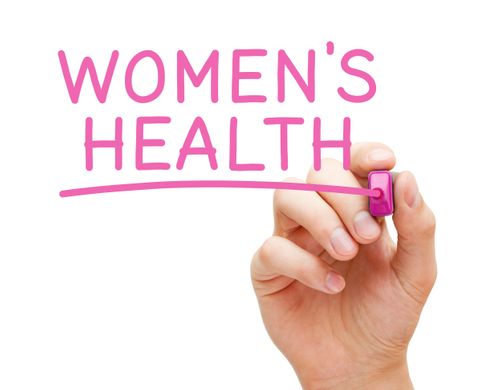May Wellness Spotlight
May is National Women’s Health Month!
Did you know that 15.2% of women aged 18+ are in fair or poor health? (per CDC). National Women’s Health Month reminds women that prioritizing your health is incredibly important! This relates to not only physical health, but mental health as well. This Wellness Spotlight will include common health risks for women and how to prioritize your health and wellbeing.
Importance of National Women’s Health Month
Women’s Health Month gives a good reminder to take care of your overall health and make it a continuous priority. This means scheduling preventative care appointments, as well as seeking necessary care when needed. This also includes finding ways to prioritize your health and be the healthiest version of yourself. In addition, it is important for women to educate themselves on the common health risks that can arise. This can help to address health concerns as soon as possible.
Common Health Concerns
Breast Cancer- According to Northwestern Medicine, breast cancer is the most common cancer in American women. There is a 12% chance of American women developing breast cancer in their lifetime. Every year in the United States, about 240,000 cases of breast cancer are diagnosed in women (per CDC).
Cervical Cancer- Cervical cancer is most frequently diagnosed in women between the ages of 35 and 44, with the average age being 50, as mentioned by The American Cancer Society. There are more than 20% of cervical cancers found in women over the age of 65. Although, these cancers rarely occur in women who are getting regular screenings for cervical cancer before age 65.
Maternal Health- Every pregnancy is unique and should be handled in the care of a skilled health care professional. There can be complications that arise, and keeping healthy is important. Many maternal health issues can be prevented by routine visits to a healthcare professional, and addressing any concerns that you may have.
Autoimmune Diseases- According to Regis College, autoimmune diseases occur when body cells that eliminate threats, such as viruses, attack health cells. While there are over 100 known autoimmune diseases, common ones include lupus, psoriasis, Crohn’s disease, and multiple sclerosis.
Mental Health- According to the Office on Women’s Health, more than 1 in 5 women in the United States experienced a mental health condition in the past year, such as anxiety or depression. Many mental conditions such as depression or bipolar disorder affect women in different ways than men. It is important to see a healthcare professional to address mental health issues.
How to prioritize your health:
Eat healthy
- Per the Dietary Guidelines for Americans 2020-2025, it recommends the following in terms of eating habits:
- Eat a variety of fruits, vegetables, and whole grains
- Incorporate a variety of protein foods into your diet including seafood, lean meats, eggs, beans, nuts, and seeds
- Eat foods low in added sugar
- Try to lower sodium, saturated fats, and trans fats
- Try to stay within your daily calorie needs
Exercise regularly
- Physical activity is considered anything that gets your body moving. It is recommended for women to participate in 150 minutes of moderate-intensity physical activity, and 2 days of muscle strengthening activity per week, as noted by the Physical Activity Guidelines for Americans. Examples of moderate intensity aerobic activity includes brisk walking, bicycling, playing tennis, water aerobics and gardening. Strength training can be done by using weight machines, dumbbells, your own body weight, or resistance bands.
Get enough sleep
- If you are not getting sleep, you are at an increased risk for many health conditions which include obesity, type 2 diabetes, and high blood pressure. It is important to be sleeping enough in order to feel your best, According to the CDC, adults aged 18-60 need seven or more hours of sleep per night.
Learn how to cope with stress:max_bytes(150000):strip_icc()/GettyImages-119703849-570ee8193df78c7d9e5b1690.jpg)
- Stress can take over our lives, and lead to unwanted medical conditions. It is important to learn healthy ways to cope with stress, to help your body unwind and feel at ease. A few ways to cope with stress include limiting alcohol intake, avoiding smoking, talking with others about your feelings, getting enough sleep, and making time for your favorite hobbies.
Get regular health screenings
- It is important to get screened to detect any type of health complication or disease, which may be hidden. It is important to schedule a yearly wellness check, as well as other appointments to check for overall health.

- Recommendations by Harvard Medical School:
- Blood Pressure – Have your blood pressure checked at least one every two years if in the healthy range (under 120/80) or once a year if above normal (between 120/80 and 139/89)
- Bone Density- Get this test at least once at age 65 or after
- Breast Cancer- Get a mammogram every two years for women ages 50-74. For those 75 and over, consult a doctor if they you need to continue
- Cervical Cancer- A pap test is recommended every three years for women ages 21-65.
- Diabetes Screening- Get tested for diabetes if your blood pressure is higher than 135/80 or if you take high blood pressure medicine.
- HIV/AIDS- Get tested for HIV/AIDS at least once after age 20
- Recommendations by Harvard Medical School:
Resources:
Healthy Eating for a Healthy Weight – CDC
Dietary Guidelines for Americans – PDF
How Much Physical Activity Do Adults Need? – CDC
Ten Top Issues for Women’s Health – World Health Organization
Women’s Health Issue’s – Northwestern Medicine
Cervical Cancer- American Cancer Society
Maternal Health – World Health Organization
Women’s Health Issues – Regis College
Autoimmune Diseases- Cleveland Clinic


